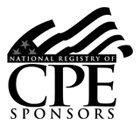
View Details/Register
View Details/Register
View Details/Register
View Details/Register
View Details/Register
View Details/Register
View Details/Register
View Details/Register
View Details/Register
View Details/Register
View Details/Register
View Details/Register
View Details/Register
View Details/Register
View Details/Register
View Details/Register
View Details/Register
View Details/Register
View Details/Register
View Details/Register
View Details/Register
View Details/Register
View Details/Register
View Details/Register



CPA - medium firm
CPA - large firm
Enrolled Agent
In this webinar, we will discuss sources and standards of tax ethics and best practices to ensure compliance and avoid penalties. In reviewing the requirements of Circular 230, the AICPA Statements on Standards for Tax Services, the AICPA Code of Professional Conduct, the IESBA's Tax Planning Standards, the NAEA Code of Ethics and Rules of Professional Conduct along with rules and regulations from State Boards of Accountancy, we will touch on common practice issues including what standards must be met to take a position on a tax return, when you can omit an answer to a question on a tax return, when you must verify information provided by a taxpayer or third party, the use of estimates, correcting errors and omissions on returns, responsibilities when faced with a conflict of interest, and the form and content of advice provided to taxpayers. We will also discuss the necessity of establishing data security plans, providing tax return documents to third parties, and requirements related to the retention of client records and other documents.
Learning Objectives:
- Recall general ethics principles
- Recognize the key elements of Treasury Department Circular 230 (applicable to those who practice before the IRS)
- Recall the key principles and rules applicable to AICPA members in the AICPA Code of Professional Conduct
- Outline requirements for AICPA members providing tax services as stated in the Statements on Standards for Tax Services (SSTSs)
- Outline the requirements for NAEA members as stated in the NAEA Code of Professional Conduct
- Review other ethical rules promulgated by state boards and the IESBA
|
FOR RECORDED COURSES WITH VIDEO Download any course document(s) (below) which may include handouts, glossary, transcripts, etc. Follow any prompts contained in the documents to help you complete the course. Most documents are searchable. |
QUESTION 1: 4:06 minutes
QUESTION 2: 11:20 minutes
QUESTION 3: 30:33 minutes
QUESTION 4: 39:59 minutes
QUESTION 5: 58:50 minutes
QUESTION 6: 01:01:31 minutes
- CPAacademy self-study courses are online.
- The self-study format allows you to a) access the material online 24/7 and b) study at your own pace.
- Per NASBA guidelines, you have one year from date of purchase to complete each program.
- Complete your final exam at any time and get graded instantly. You can retake the exam at no additional charge (unlimited attempts).
- Print your own certificate of completion on the spot upon passing the exam.
- Grading policies: a) courses have a minimum passing score 70% b) test takers will not be provided feedback on failed exams.
- Upon achieving a passing score, test takers will be notified of the correct answers to the questions missed.

Roby Sawyers
Roby Sawyers, CPA, PhD, Professor of Accounting
Undergraduate Program Director
[email protected]
(919) 515-4443
ROBY SAWYERS, Ph.D., CPA, is a Professor in the Department of Accounting at NC State University. He is an author of Federal Tax Research (Cengage Learning) as well as chapters on international tax, state and local tax, tax research, and tax practice and procedure in Corporate, Partnership, Estate and Gift Taxation (Van-Griner). He serves as co-editor and author of the SALT-Block column in Taxes-The Tax Magazine and served as editor of the Tax Practice Responsibilities column in The Tax Adviser magazine from 2018-2020.
Dr. Sawyers is an active member of the American Institute of Certified Public Accountants (AICPA) from which he received the 2020 Arthur J. Dixon Memorial Award. He has served the AICPA as a member of the Tax Practice Responsibilities Committee as well as chair of the Tax Legislation and Policy Committee and the Trust, Estate and Gift Tax Committee. He has also served on the AICPA’s Tax Executive Committee and Precertification Education Executive Committee.
He teaches CPE and CE courses for a variety of firms and other organizations including CPAacademy.org, KPMG and the AICPA.


NASBA Approved
CPAacademy.org (Sponsor Id#: 111889) is registered with the National Association of State Boards of Accountancy (NASBA) as a sponsor of continuing professional education on the National Registry of CPE Sponsors. State boards of accountancy have final authority on the acceptance of individual courses for CPE credit. Complaints regarding registered sponsors may be submitted to the National Registry of CPE Sponsors through its website: www.nasbaregistry.org.
CPAacademy.org 1685 S. Colorado Blvd, Suite #205, Denver, CO 80222
Dr. Sawyers is an active member of the American Institute of Certified Public Accountants (AICPA) from which he received the 2020 Arthur J. Dixon Memorial Award. He has served the AICPA as a member of the Tax Practice Responsibilities Committee as well as chair of the Tax Legislation and Policy Committee and the Trust, Estate and Gift Tax Committee. He has also served on the AICPA’s Tax Executive Committee and Precertification Education Executive Committee.
He teaches CPE and CE courses for a variety of firms and other organizations including CPAacademy.org, KPMG and the AICPA.


